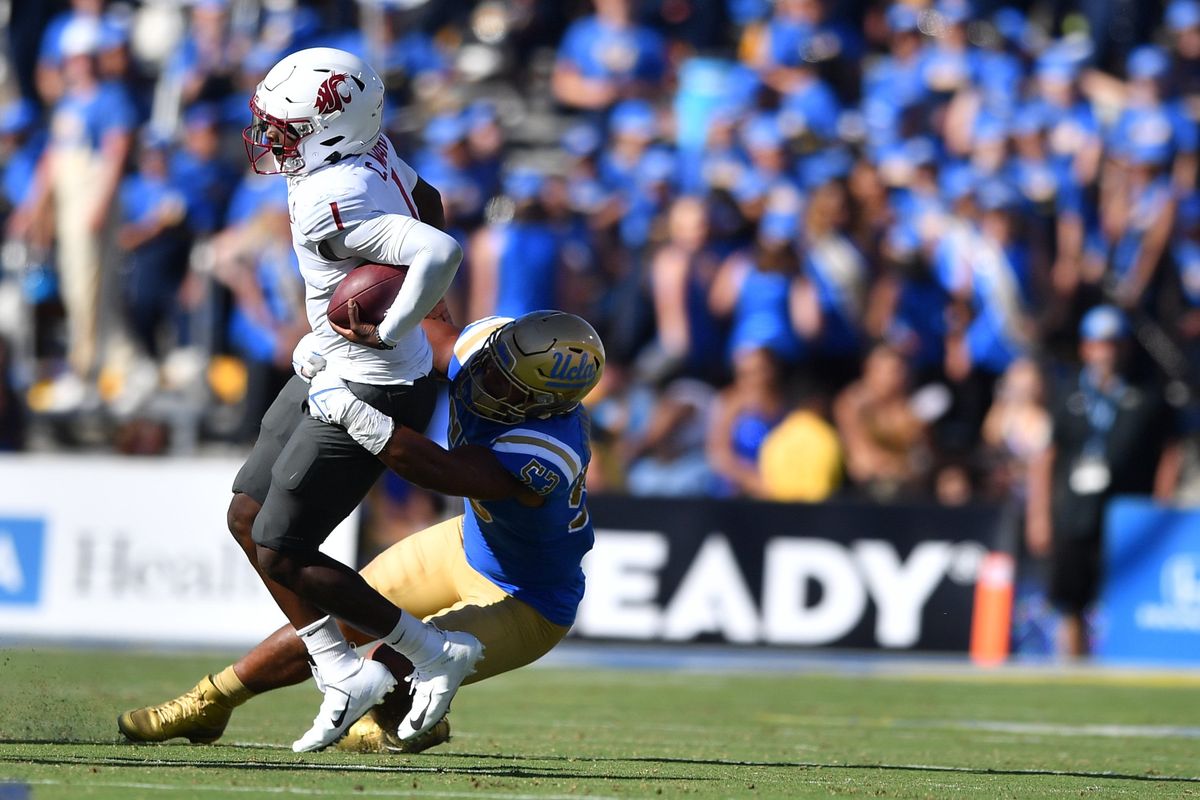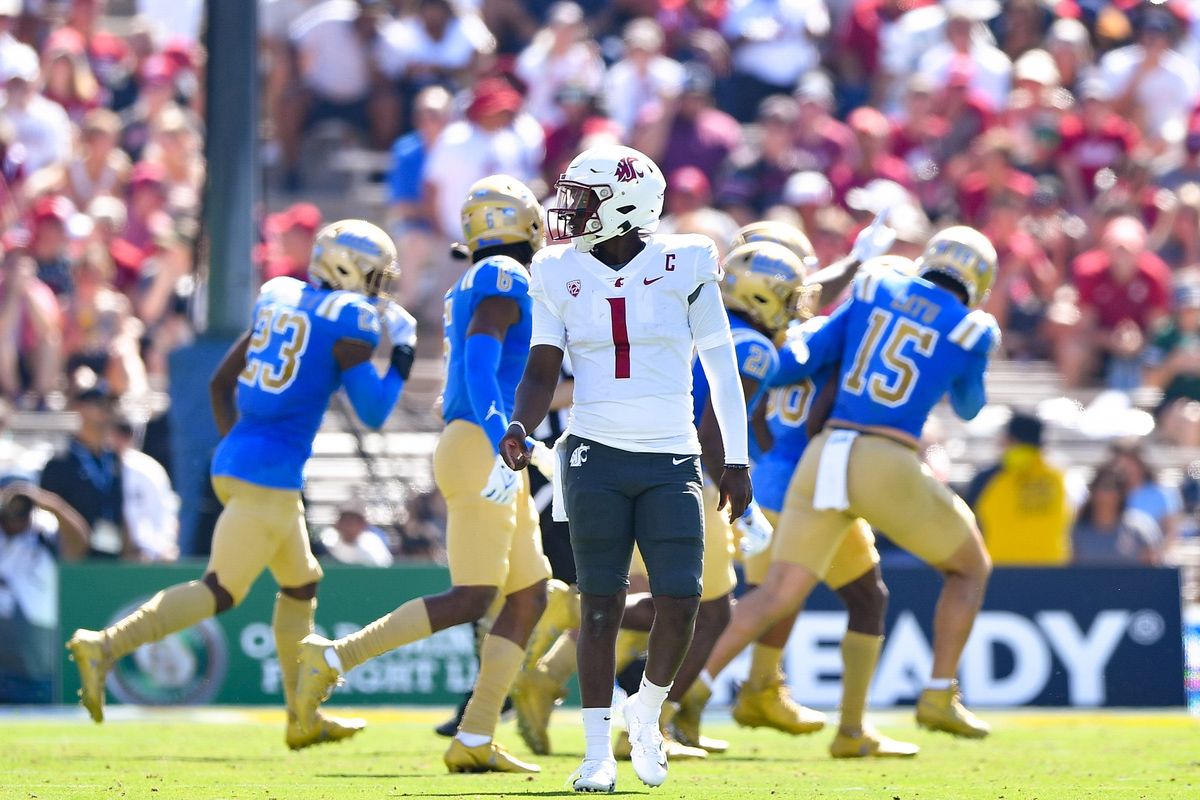Analysis: WSU likely won’t face another defense like UCLA’s, but the Cougars have issues up front

PASADENA, Calif. – So much of what ailed No. 13 Washington State Saturday in a 25-17 loss to UCLA the Cougars will likely not see again this regular season.
They will likely not run into another defensive line like the Bruins’, which sacked Cameron Ward twice and made him scramble dozens of times. They will likely not clash with another edge rusher like Laiatu Latu, who had a sack and three hurries, nor will they likely cross paths with a lineman like Gabriel Murphy, who recorded a sack and 2½ tackles for loss.
In that department, Washington State experienced an anomaly, and when Arizona comes to town next weekend, the Cougars can most likely expect an easier day.
“They’re for sure, the best defense we’ve played so far this year,” Ward said. “The thing about them is that their D-line, linebackers – they have some of the best front seven in the country. They got after us today. They punched us in the mouth early, and they punched us in the mouth the majority of the game.”
They likely won’t see another defense that can do that so consistently, which is the good news for the Cougars. The bad news is they thought they had established themselves as a Pac-12 championship contender, and to keep those aspirations, they cannot afford for their offensive line to play remotely like it did in this loss.
This much is clear: WSU has real issues up front. In the loss, Ward had to scramble on almost every dropback. That became clear so early that the Cougars resorted to quick passes to the flat, a first this season, and they lost a fumble on one of those plays. They even placed a stronger emphasis on running the ball, but they finished with 19 carries for 12 yards.
Washington State’s offensive line could not move much of anything, which was never more apparent than on the visitors’ final play from scrimmage, a fourth-and-1 near midfield. They called a quarterback keeper for Ward, who was mobbed for no gain. He couldn’t run forward because left guard Christian Hilborn, who has played well this season, couldn’t pull in time to create a running lane.
Question the play call, but WSU head coach Jake Dickert said coaches “thought we could get them in unbalanced, where they were normally a pretty basic defense, and they stayed in the pressure situation.”
The Cougars have demonstrated a concerning inability to run the ball this season, an issue that Ward has mitigated by scrambling and making strong throws, but that’s not a problem a Pac-12 champion has. Against FBS opponents this season, the Cougars’ rushing numbers are:
• Colorado State: 37 carries, 90 yards, three touchdowns.
• Wisconsin: 34 carries, 86 yards, one touchdown.
• Oregon State: 30 carries, 106 yards, one touchdown.
• UCLA: 19 carries for 12 yards.
That comes out to 120 carries for 294 yards and five touchdowns, an average of 2.5 yards/carry.
More concerning for WSU in those games, though, are the efforts from its running backs. Ward has boosted the Cougars’ rushing stats by making smart decisions to scramble, but tailbacks Nakia Watson and Jaylen Jenkins have seen different outcomes.
• Colorado State: Watson, seven carries for 15 yards; Jenkins, seven carries for 11 yards.
• Wisconsin: Watson, 11 carries for 26 yards; Jenkins, two carries for 11 yards.
• Oregon State: Watson, eight carries for 46 yards; Jenkins, five carries for 28 yards.
• UCLA: 11 carries total for 25 yards.

Early on, this seemed like a problem WSU could fix, and Dickert said he still sees it that way.
“I think we have what it takes up front to be better,” Dickert said.
But what the Cougars’ linemen are showing is that these problems are part of their identity – which doesn’t have to be a bad thing.
Washington State has long prided itself on the Air Raid offense. The Cougars have recruited offensive linemen who can facilitate that approach. They have succeeded in a meaningful way. Credit coaches and their talent evaluation for that.
But WSU has never been a ground-and-pound, shove-it-down-your-throat team, which means the team recruits linemen who struggle to play like that. That’s a huge reason why the Cougars have fared so poorly in the rushing game this season. It’s an even bigger reason why, after four games, Pro Football Focus gave them a run-blocking grade 56.3 – last in the Pac-12.
That isn’t an indictment on the offensive linemen, but these are the players on the roster, and running the ball is a part of the game. They will need to be better.
In the loss, the group showed how meaningful a role it has in helping Ward succeed. The Bruins recorded three sacks, six quarterback hurries and six tackles for loss. Ward rarely had time to sit back and throw. He was rushed all game, even when the Bruins only rushed three or four, which is no way to make a comeback.
“I thought it was everything,” Dickert said. “It wasn’t just that front seven. I mean, (the Bruins) just have waves of these guys coming in. They’re creatures, and I don’t say that in a bad way. I mean, they’re big, long. They can rush the passer. They have aggressive schemes. I think they kept us off-balance, and we couldn’t offset it enough to stay ahead of the chains. And when you gotta pass, I thought that’s when they pinned their ears back.”
Washington State also needs its offensive linemen to be better run-blockers. Otherwise, the Cougars put themselves in obvious passing situations, which is when their offensive line struggles the most. Few teams have the players to hold up against blitzes in those scenarios. The Cougars are no exception.
Can Ward be better? Without question. On too many occasions in the loss he scrambled, which was the right decision, but he ran into trouble when he held on to the ball too long. He is a relentless competitor, but the smart ones know when to throw it away and take your lumps. Ward can continue developing by internalizing when to act accordingly.
But for the Cougars to compete with the Pac-12’s best, the offensive line can’t put Ward in those situations as often as it did in the loss. Otherwise, the loss could precede more like it.